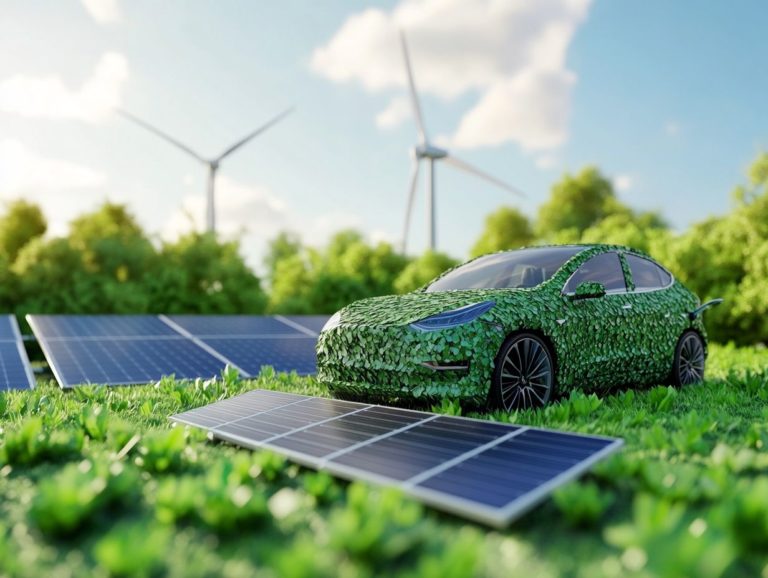understanding electric vehicle tax incentives
As electric vehicles (EVs) gain momentum, explore the financial advantages that accompany your purchase.
Electric vehicle tax incentives are pivotal in enhancing the accessibility of these environmentally friendly options.
This guide will illuminate the various types of incentives available at federal, state, and local levels, along with the eligibility requirements and steps needed to claim these benefits.
Discover how these incentives can save you money while also considering potential changes on the horizon.
If you re thinking about buying an EV, this guide will expertly navigate you through the incentives landscape.
Contents
- Key Takeaways:
- Overview of Electric Vehicle Tax Incentives
- Types of Incentives Available
- Eligibility Requirements
- How to Claim Electric Vehicle Tax Incentives
- Benefits of Electric Vehicle Tax Incentives
- Potential Changes to Electric Vehicle Tax Incentives
- Frequently Asked Questions
- What are electric vehicle tax incentives?
- Who is eligible for electric vehicle tax incentives?
- What types of electric vehicles are eligible for tax incentives?
- How much are the tax incentives for electric vehicles?
- Are there any income limits for electric vehicle tax incentives?
- Are electric vehicle tax incentives available in all areas?
Key Takeaways:

Here s what you need to know about electric vehicle tax incentives:
Electric vehicle tax incentives provide financial benefits for purchasing and owning an electric vehicle. These incentives vary at the federal, state, and local levels, offering tax credits, deductions, and other benefits. For more detailed information on understanding the tax benefits for EV owners, individuals must meet eligibility requirements and follow specific steps outlined by the government.
Overview of Electric Vehicle Tax Incentives
Electric vehicle tax incentives play a vital role in government initiatives aimed at promoting the adoption of clean energy vehicles. These incentives, highlighted by understanding federal EV tax credits for 2024 and various state programs like California’s Clean Air Vehicle program, are designed to make your transition to an electric vehicle more appealing.
By offering financial benefits, including the EV tax credit, the federal government seeks to lighten your tax burden while championing environmental sustainability across North America. To navigate these options effectively, understanding incentive trends for electric vehicles is crucial, as these incentives depend on factors like vehicle eligibility, battery capacity, and purchase price, all of which significantly influence your decision-making process when considering electric, hybrid, or plug-in hybrid vehicles.
What are Tax Incentives for Electric Vehicles?
Tax incentives for electric vehicles are an array of financial benefits provided by the federal government and select states designed to motivate you to purchase clean energy automobiles. Among these is the EV tax credit, along with understanding tax deductions for EV purchases, expertly administered by the IRS.
These incentives can significantly reduce both your taxable income and overall tax liability, making them an enticing choice for eco-conscious buyers. For example, what you need to know about EV tax policy highlights that the federal EV tax credit offers up to $7,500 for eligible vehicles, effectively slashing the price of a new electric car.
Some states even provide their own credits or rebates, such as California’s Clean Vehicle Rebate Program, which can further amplify your savings. Whether you re eyeing a new, used, or hybrid vehicle, these financial perks not only champion sustainable transportation but also alleviate the financial pressure that often accompanies these increasingly popular choices.
Types of Incentives Available
The incentives available for electric vehicles include a diverse array of federal tax credits and state-specific programs tailored to encourage the purchase of clean vehicles.
Each of these incentives offers distinct tax benefits that eligible consumers can take advantage of, enhancing the appeal of making an eco-friendly choice.
Federal Tax Credits
Federal tax credits for electric vehicles, particularly the EV tax credit, can offer you substantial financial relief, allowing you to lower your tax liability based on the credit amount associated with the purchase of eligible vehicles.
These credits can vary significantly due to factors linked to the vehicle, including its vehicle identification number (VIN), manufacturer s suggested retail price (MSRP), and battery capacity.
To qualify for the credit, you need to purchase a vehicle that meets specific standards set by the federal government. Eligibility depends not only on the vehicle being fully electric or a plug-in hybrid but also on whether it boasts a battery capacity that surpasses a certain threshold.
The vehicle’s VIN, a unique code for each vehicle, plays a crucial role in determining the timing of the credits, as some manufacturers may have already hit their cap for qualifying credits. Understanding these elements is vital for you as a potential buyer to accurately gauge the financial benefits that await you.
Don t miss out on these savings! Act now to make your EV purchase while these incentives last.
State and Local Incentives

State and local incentives are essential in promoting electric vehicles, providing you with additional tax deductions and government benefits that enhance federal incentives, especially in states like California where clean energy takes center stage.
These incentives often come in the form of tax credits that significantly lower the initial cost of purchasing an electric vehicle, along with rebates that offer immediate financial relief right at the point of sale.
For example, states like New York and New Jersey have distinct programs that encourage individuals and support businesses investing in electric vehicle infrastructure.
On the other hand, some southern states may present less comprehensive programs, opting instead for simpler initiatives that may not hold the same value as those found in more environmentally focused regions.
Understanding these differences is crucial as you explore your options, ensuring that your choices align with your financial aspirations and ecological values.
Eligibility Requirements
Eligibility requirements for electric vehicle tax credits are essential in determining your ability to take advantage of hybrid vehicle incentives.
Specific guidelines regarding qualifying vehicles, income limits, and modified adjusted gross income (MAGI), which is your total income after certain deductions, significantly influence whether you qualify for these credits.
Understanding these criteria will help you navigate the benefits available when considering an electric vehicle purchase.
Qualifying Vehicles and Income Limits
To qualify for the EV tax credit, you need to navigate specific criteria set by the IRS, which includes key factors like battery capacity, purchase price, and income limits that dictate your eligibility for this enticing credit.
When determining what makes a vehicle eligible, it s essential to recognize the distinctions among new, used, and hybrid models. New electric vehicles generally come with higher credit amounts due to their cutting-edge technology and extended battery life.
Used EVs, while subject to different criteria, still offer an attractive opportunity for those who are budget-conscious. Hybrid vehicles, however, often reside in a gray area as they typically don t qualify for the same credits afforded to their fully electric counterparts.
Moreover, income limits can present additional hurdles; those with higher earnings might find themselves limited in who can qualify for these credits. This restriction can impede the transition to sustainable energy among wealthier demographics.
How to Claim Electric Vehicle Tax Incentives
Claiming your electric vehicle tax incentives can be a rewarding process with the right steps!
You need to accurately report your EV purchases on your tax returns while fully understanding the process of claiming deductions. This ensures that you maximize the benefits available to you.
Steps for Claiming Tax Credits and Deductions
Claiming tax credits and deductions for electric vehicles starts with ensuring you have all the necessary documentation in order, including proof of purchase and details confirming your eligibility. Then it s all about accurately completing your tax returns.
To make this process smoother, gather receipts, invoices, and any related correspondence that substantiates your eligibility for these credits. Familiarizing yourself with the relevant forms keeping in mind they may vary by jurisdiction is also key.
Filling them out meticulously helps prevent any errors that could throw a wrench in your claiming process. Before filing, verifying your credit eligibility is a smart move to ensure all qualifications are met, maximizing your chances of securing the full benefits available to you.
Additionally, don t overlook potential deductions from other expenses linked to vehicle usage; this can further enhance the overall outcome of your tax return.
Benefits of Electric Vehicle Tax Incentives

The benefits of electric vehicle tax incentives go far beyond just financial savings. They play a crucial role in enhancing environmental impact and fostering the adoption of clean energy throughout North America, perfectly aligning with broader sustainability goals. For those interested, understanding the process for EV rebates can provide valuable insights.
Don t miss out on these fantastic savings! Act now to explore your options for electric vehicles and incentives to make a greener choice!
Financial Savings and Environmental Impact
The financial savings you gain from electric vehicle tax incentives not only lighten your tax burden. They also create a substantial positive environmental impact by encouraging the adoption of clean energy solutions.
By reducing upfront costs, these incentives make electric vehicles more accessible to you. This leads to increased sales and broader adoption among the general public. As you and others transition from traditional gasoline-powered cars, you contribute to a noticeable decrease in harmful carbon emissions, improving air quality and public health in the process.
This shift not only enhances your financial savings but also cultivates a collective commitment to sustainability. When more people embrace electric vehicles, they support the growth of renewable energy initiatives, promoting a transition toward a greener economy and paving the way for a cleaner, more sustainable future for generations to come.
Potential Changes to Electric Vehicle Tax Incentives
You can expect potential changes to electric vehicle tax incentives on the horizon, especially with new legislation anticipated to be enacted by October 2024. Act now! Changes to tax incentives are coming soon, and you don’t want to miss out on potential savings.
This could significantly reshape the landscape of tax credits and benefits available to you as a consumer.
Upcoming Legislation and Impact on Incentives
Upcoming legislation regarding electric vehicle tax incentives is poised to significantly influence how the IRS hands out these credits, potentially reshaping the future of clean energy initiatives.
With proposed changes aimed at streamlining eligibility and enhancing the value of these credits, you might find yourself eagerly anticipating how these developments could shift consumer behavior.
As awareness grows around the potential savings from these enhanced incentives, you could see a surge in demand for electric vehicles, fostering a more vibrant market.
This surge may prompt automakers to ramp up their investments, driving them to innovate and create more environmentally friendly models.
Ultimately, these legislative changes could play a crucial role in transforming both consumer preferences and the dynamics of the electric vehicle industry.
Frequently Asked Questions
Here are some common questions about electric vehicle tax incentives:
What are electric vehicle tax incentives?

Electric vehicle tax incentives are government programs that provide financial benefits, such as tax credits or rebates, to encourage the purchase and use of electric vehicles. For more details on these programs, including understanding EV charging incentives, tax credits reduce the amount of tax you owe, while rebates give you money back after your purchase.
Who is eligible for electric vehicle tax incentives?
Eligibility for electric vehicle tax incentives varies depending on the specific program. Generally, individuals or businesses who purchase or lease electric vehicles may be eligible for these incentives.
What types of electric vehicles are eligible for tax incentives?
Most electric vehicles, including plug-in hybrids and all-electric vehicles, are eligible for tax incentives. However, the specific models and eligibility requirements may vary by program.
How much are the tax incentives for electric vehicles?
The amount of tax incentives for electric vehicles also varies by program. In general, these incentives can range from a few hundred dollars to several thousand dollars, depending on factors such as the battery size and the vehicle’s purchase price. For a deeper insight, consider understanding state-level EV incentive programs.
Are there any income limits for electric vehicle tax incentives?
Some programs may have income limits for individuals or businesses to qualify for electric vehicle tax incentives. These limits may vary by location and can be found on the program’s website or by contacting your local government.
Are electric vehicle tax incentives available in all areas?
No, electric vehicle tax incentives are not available in all areas. They are typically offered by state or local governments, so availability may vary depending on your location. Check with your state or local government to see if there are any incentives available in your area.






